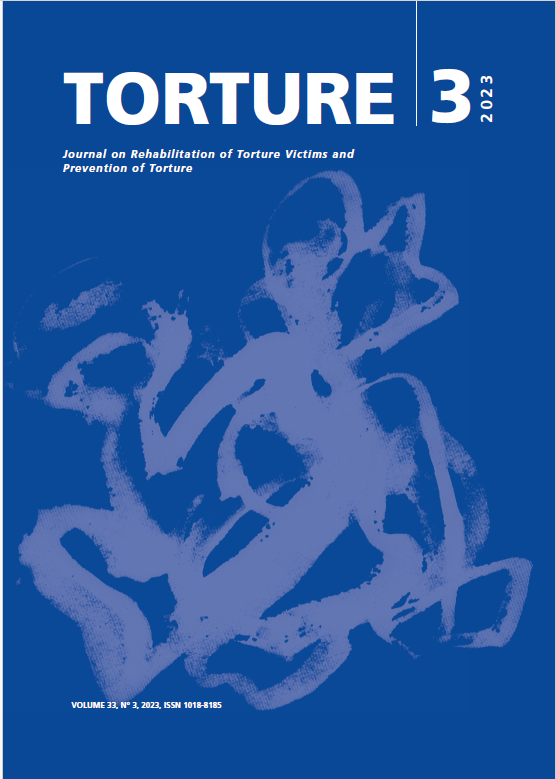Substitutive trauma: preparing grounds for the Russian attack on Ukraine
DOI:
https://doi.org/10.7146/torture.v33i3.141714Keywords:
psychological trauma, war, Holistic approachAbstract
Unprocessed collective trauma may create fertile soil for political manipulation. This article introduces a new concept, that of "substitutive trauma," which refers to the utilization of unprocessed collective traumatic experiences by political leadership to create shared feelings of victimhood and vengeful attitudes within a population. The analysis explores how a substitutive trauma-based psycho-political dynamic culminated in February 2022 in Russia’s war against Ukraine. The article argues that the community of traumatic stress professionals, studying and understanding macro-societal processes can contribute to reducing and ameliorating such destructive psycho-political developments.
References
Atwal, M. & Bacon, E. (2012). The youth movement Nashi: contentious politics, civil society, and party politics, East European Politics, 28:3, 256-266, DOI: 10.1080/21599165.2012.691424
Geert E. Smid (2020). A framework of meaning attribution following loss, European Journal of Psychotraumatology, 11:1, DOI: 10.1080/20008198.2020.1776563
Gould-Davies, N. (2020). What Vladimir Putin Tells Us About His Relations to The West. International Institute of Strategic Studies. URL: https://www.iiss.org/blogs/analysis/2020/07/putins-relations-with-the-west
Hopper, E. (2003). Traumatic Experience in the Traumatic Life of Groups: The ForthBasic Assumption: Incohession: Aggregation/Massification or (ba) I:A/M. London &New York: Jessica Kingslay Publishers
Jilge, W. (2016). Russki Mir: Russian World. On the Genesis of Geopolitical Concept and it ‘s effect on Ukraine. Discussion Moderated by Stefan Meister, DGFP https://dgap.org/en/events/russkiy-mir-russian-world
Kazlauskas, E., Gailiene, D., Vaskeliene, I., & Skeryte-Kazlauskiene, M. (2017). Intergenerational Transmission of Resilience? Sense of Coherence Is Associated between Lithuanian Survivors of Political Violence and Their Adult Offspring. Frontiers in Psychology, 8. doi:10.3389/fpsyg.2017.01677
Kovalyova, A. (2013). Is Vladimir Putin Rewriting Russia’s History Books? NBC News. URL (retrieved on March 7, 2022): https://www.nbcnews.com/news/world/vladimir-putin-rewriting-russias-history-books-flna2d11669160
Kyle, J. & Gultchin, L. (2018). Populists in Power Around the World. Tony Blair Institute for Global Change. Retrieved on August 30, 2022, from: https://institute.global/sites/default/files/articles/Populists-in-Power-Around-the-World-.pdf
Kudos, (2010). “Russian World” – Russia’s Soft Power Approach to Compatriots Policies. In: Russian Public Relation Activities and Soft Power: 81/10, 2-6 https://www.research-collection.ethz.ch/bitstream/handle/20.500.11850/26212/eth-2215-01.pdfalism
Lee, B.X. (2017). The Dangerous case of Donald Trump: 27 Psychiatrists and Mental Health Experts Assess President. New York: NY, Saint Martin’s Press
Levada Center (2022). Putin’s Approval by Years. Retrieved on April 2, 2022 from: https://www.levada.ru/en/
Maercker A (2023) How to deal with the past? How collective and historical trauma psychologically reverberates in Eastern Europe. Front. Psychiatry 14:1228785. doi: 10.3389/fpsyt.2023.1228785
Evgenia Milman, Robert A. Neimeyer, Marilyn Fitzpatrick, Christopher J. MacKinnon, Krista R. Muis & S. Robin Cohen (2017) Prolonged grief symptomatology following violent loss: the mediating role of meaning, European Journal of Psychotraumatology, 8:sup6, DOI: 10.1080/20008198.2018.1503522
Huibertha B. Mitima-Verloop, Paul A. Boelen & Trudy T. M. Mooren (2020) Commemoration of disruptive events: a scoping review about posttraumatic stress reactions and related factors, European Journal of Psychotraumatology, 11:1, DOI: 10.1080/20008198.2019.1701226
Roginski, A., Zhemkova, E. (2016). In-between of Sympathy and Indifference (in Russian language). Memorial. Retrieved on 26 of August, 2022 from: https://www.memo.ru/media/uploads/2017/08/22/mezhdu-sochuvstviem-i-ravnodushuem_reabilitacia-zhertv-sovetskikh-repressiy.pdf
Soldatov, A. & Borogan, I. (2022). The Man Behind Putin’s Military. How Sergei Shoygu Paved the Way to Russians Ukraine Assault. Forreign Aaffaris, Retrived on April 2: https://www.foreignaffairs.com/articles/2022-02-26/man-behind-putins-military?utm_medium=social
Tiido A. (2015). The «Russian World»: the blurred notion of protecting Russians abroad. Polski Przegląd Stosunków Międzynarodowych. Warszawa: Uniwersytet Kardynała S. Wyszyńskiego, 5, 131—151. file:///Users/janajavakhishvili/Downloads/2413-Tekst%20artyku%C5%82u-3843-1-10-20180503.pdf
Volkan, V. D. (1997). Bloodlines: From Ethnic Pride to Ethnic Terrorism. New York: Farrar, Straus and Giroux
Volkan, V.D. (2006). What Some Monuments Tell us about Mourning and Forgiveness. In: Barkan, E., Karn, A. (eds), Taking Wrongs Seriously: Apologies andReconciliation. Stanford, CA: Stanford University Press. 115-131
Volkan, V.D., Fowler, C. (2009). Large-group Narcissism and Political Leaders with Narcissistic Personality Organization. Psychiatric Annals, Vol: 39 (4), 214-223
Volkan, V. D. (2019). Large-group Identity, Who Are We Now? Leader-Follower Relationships and Societal-Political Divisions. The American Journal of Psychoanalysis, 79(2), 139–155. doi:10.1057/s11231-019-09186-2
Volkan, V. & Javakhishvili, J.D. (2022). Invasion of Ukraine: Observation on Leader-Followers Relationships. The American Journal of Psychoanalysis, vol.82, November 2, pp: 189-2010
Yakovlev, V. (2016). I was called Vladimir in honor of my grandfather. Retrieved on August 15, 2022 from: https://www.ogkochetkov.ru/blog/detail/post-vladimira-jakovleva-menja-nazvali-v-chest-deda-ehto-krik-dushi/#.YwZCFOxBx-U
Downloads
Published
How to Cite
Issue
Section
License
Copyright (c) 2023 Torture Journal

This work is licensed under a Creative Commons Attribution-NonCommercial-NoDerivatives 4.0 International License.
We accept that some authors (e.g. government employees in some countries) are unable to transfer copyright. The Creative Commons Licence Attribution-NonCommercial-NoDerivatives 4.0 International (CC BY-NC-ND 4.0) covers both the Torture Journal and the IRCT web site. The publisher will not put any limitation on the personal freedom of the author to use material contained in the paper in other works which may be published, provided that acknowledgement is made to the original place of publication.


